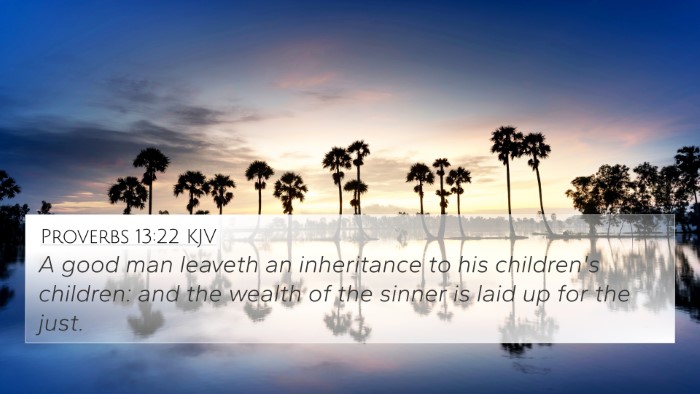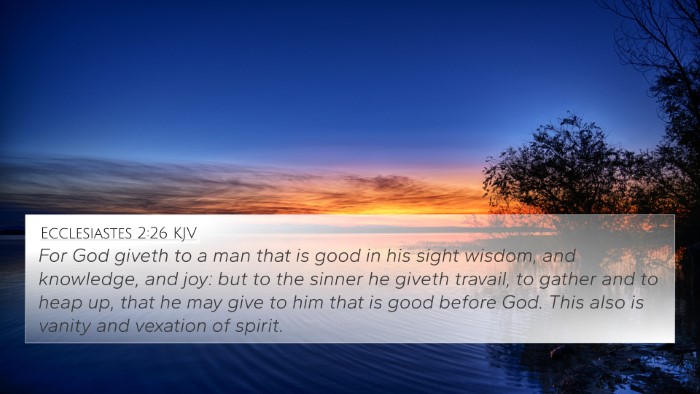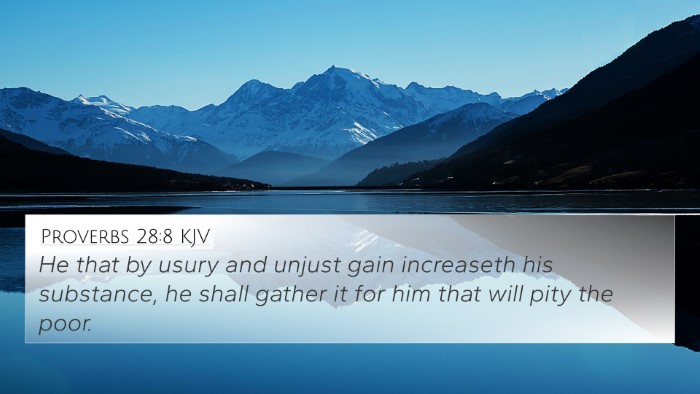Old Testament
Genesis Exodus Leviticus Numbers Deuteronomy Joshua Judges Ruth 1 Samuel 2 Samuel 1 Kings 2 Kings 1 Chronicles 2 Chronicles Ezra Nehemiah Esther Job Psalms Proverbs Ecclesiastes Song of Solomon Isaiah Jeremiah Lamentations Ezekiel Daniel Hosea Joel Amos Obadiah Jonah Micah Nahum Habakkuk Zephaniah Haggai Zechariah MalachiJob 27:17 Similar Verses
Job 27:17 Cross References
He may prepare it, but the just shall put it on, and the innocent shall divide the silver.
Uncover the Rich Themes and Topics of This Bible Verse
Listed below are the Bible themes associated with Job 27:17. We invite you to explore each theme to gain deeper insights into the Scriptures.
Job 27:17 Cross Reference Verses
This section features a detailed cross-reference designed to enrich your understanding of the Scriptures. Below, you will find carefully selected verses that echo the themes and teachings related to Job 27:17 KJV. Click on any image to explore detailed analyses of related Bible verses and uncover deeper theological insights.

Proverbs 13:22 (KJV) »
A good man leaveth an inheritance to his children's children: and the wealth of the sinner is laid up for the just.

Ecclesiastes 2:26 (KJV) »
For God giveth to a man that is good in his sight wisdom, and knowledge, and joy: but to the sinner he giveth travail, to gather and to heap up, that he may give to him that is good before God. This also is vanity and vexation of spirit.

Proverbs 28:8 (KJV) »
He that by usury and unjust gain increaseth his substance, he shall gather it for him that will pity the poor.
Job 27:17 Verse Analysis and Similar Verses
Understanding Job 27:17
Job 27:17 states: "He may prepare it, but the just shall put it on, and the innocent shall divide the silver." This verse serves as a profound reflection on the themes of justice, wealth, and divine retribution in the context of Job's suffering and his unwavering integrity.
Commentary Insights
The insights from renowned public domain commentaries help us delve deeper into the meaning of this verse:
- Matthew Henry: Henry emphasizes the overarching principle of divine justice. He posits that while the wicked may accumulate wealth, it is ultimately the righteous who will benefit from it. This wealth, gained unjustly, will be redistributed to those who honor God and walk in integrity.
- Albert Barnes: According to Barnes, this verse underscores the inevitability of justice. He discusses how the wicked may seemingly prosper, but their wealth is transient. The true and righteous will ultimately prevail and "put on" that which was wrongfully acquired by others, symbolizing a future reversing of fortunes.
- Adam Clarke: Clarke provides a scholarly exploration of the terms used in this verse, particularly the term "divide the silver." He notes that it symbolizes not just physical wealth but also blessings, signifying that those who remain innocent and upright will receive blessings and provisions, even amidst adversity.
Key Themes and Concepts
This verse touches upon several critical themes:
- Divine Justice: An assertion that God will ultimately reward the just and punish the wicked.
- Human Integrity: The importance of maintaining one's integrity, even in the face of suffering.
- Wealth Redistribution: A prophetic anticipation that the fortunes of the wicked will transition to the hands of the righteous.
Bible Cross-References
This verse connects with several significant scriptures that echo its themes:
- Psalms 37:16-17: "A little that a righteous man hath is better than the riches of many wicked." This verse reinforces the notion that righteousness is more valuable than material wealth.
- Proverbs 13:22: "A good man leaves an inheritance to his children's children: and the wealth of the sinner is laid up for the just." Here, the future benefits of the righteous are further emphasized.
- Proverbs 28:8: "He that by usury and unjust gain increaseth his substance, he shall gather it for him that will pity the poor." A clear contrast between the wealth gained through injustice and its eventual rediscovery by the compassionate.
- Isaiah 61:6: "But ye shall be named the Priests of the Lord: men shall call you the Ministers of our God: ye shall eat the riches of the Gentiles, and in their glory shall ye boast yourselves." This verse illustrates God's promise to elevate the righteous to receive what is lost or taken by the unrighteous.
- Ecclesiastes 2:26: "For God giveth to a man that is good in his sight wisdom, and knowledge, and joy: but to the sinner he giveth travail, to gather and to heap up, that he may give to him that is good before God." It adds depth to the understanding of divine distribution of wealth.
- Matthew 5:5: "Blessed are the meek: for they shall inherit the earth." This aligns with the theme of the righteous receiving the earth rather than the aggressive and wicked.
- Luke 16:11: "If therefore ye have not been faithful in the unrighteous mammon, who will commit to your trust the true riches?" It poses the idea that faithfulness in little will open the doors to greater riches, underscoring the moral obligation attached to wealth.
Exploring Connections between Bible Verses
By cross-referencing Job 27:17 with other Biblical texts, we can unlock its deeper meanings:
- In understanding links between Job and Psalms, one sees the consistent theme that the poor in spirit and the righteous will ultimately be blessed as seen across the scriptures.
- The relationship between Job and Proverbs can be explored to compare the evidences of wisdom against wealth gained through wickedness.
- A study of Job alongside Matthew showcases the continuity of God's promises throughout the text, especially regarding the meek inheriting the earth.
Tools for Bible Cross-Referencing
Utilizing tools and methods for cross-referencing can greatly enhance one's understanding of Biblical texts:
- Bible Concordance: A helpful tool for locating keywords within the scriptures and finding associated verses.
- Bible Reference Resources: Guides and tools that aid in identifying scripture connections.
- Cross-Reference Bible Study: Techniques to study the Bible thematically and contextually.
Conclusion
Job 27:17 emphasizes the triumph of justice and the assurance that the innocent will ultimately receive blessings that may be initially withheld by the wicked. Through the connections established between various scriptures, we see a rich tapestry of divine principles at play. Engaging in cross-referencing not only deepens our understanding of individual verses but illuminates the broader narrative of redemption, justice, and divine provision across the entirety of the Scriptures.


